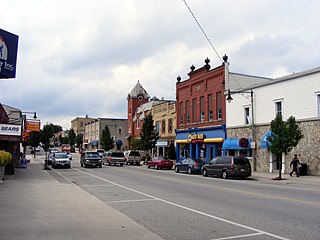Related Research Articles

The Transport and General Workers' Union was one of the largest general trade unions in the United Kingdom and Ireland – where it was known as the Amalgamated Transport and General Workers' Union (ATGWU) to differentiate itself from the Irish Transport and General Workers' Union – with 900,000 members. It was founded in 1922 and Ernest Bevin served as its first general secretary.
The National Farmers' Union (NFU) is an employer association representing farming and growing businesses within England and Wales.
The National Transport Workers' Federation (NTWF) was an association of British trade unions. It was formed in 1910 to co-ordinate the activities of various organisations catering for dockers, seamen, tramwaymen and road transport workers.
The Dock, Wharf, Riverside and General Labourers Union (DWRGLU), often known as the Dockers' Union, was a British trade union representing dock workers in the United Kingdom, founded in 1887 and merged into the Transport and General Workers' Union in 1922.

The Ceramic and Allied Trades Union (CATU) was a trade union representing pottery workers in the United Kingdom.

The Irish Transport and General Workers Union (ITGWU) was a trade union representing workers, initially mainly labourers, in Ireland.

Joseph Arch was an English trade unionist and politician, born in Barford, Warwickshire, who played a key role in unionising agricultural workers and in championing their welfare. Following their enfranchisement, he became a Member of Parliament.

Harriston is a community in the Town of Minto in Wellington County, Ontario, Canada. In 1999, Harriston was amalgamated with the communities of Palmerston, Clifford, and Minto Township to form the Town of Minto. Harriston is located at the headwaters of the Maitland River, and has several shops, restaurants, a library, an art gallery and cultural centre.

The National Union of Agricultural and Allied Workers (NUAW) was a trades union representing farmworkers in the United Kingdom. The Union was founded in 1906 by trade union activist George Edwards. It was dissolved in 1982 when it merged into the Agricultural Section of the Transport and General Workers' Union.
The National Amalgamated Union of Labour (NAUL) was a general union in the United Kingdom.

The Amalgamated Society of Boilermakers, Shipwrights, Blacksmiths and Structural Workers (ASB) was a trade union in the United Kingdom. Many of its members worked in shipbuilding, in which industry it was the leading trade union, while over time it also developed strength in engineering and construction.
Philip Francis Johnson, usually known as P. F. Johnson was an Irish nationalist political labour activist and Kanturk hotel proprietor. Born at Mallow, County Cork, he co-founded in 1869 the Kanturk Labourers’ Club, where he was lifelong committed to the well-being of labourers in the Munster region. He had close Fenian connections and was active in the Land League. Although an anti-Parnellite he supported the Irish National League with a branch in Kanturk.

The National Agricultural Labourers Union (NALU) was a trade union representing farm workers in Great Britain.
George M. Ball was a British politician and trade unionist.
George Mitchell was a British stonemason, who became prominent in the National Agricultural Labourers' Union.
George Rix was a British trade union leader and politician.

Henry Taylor was a British trade union leader.
James E. Matthew Vincent was a British newspaper editor and trade union official.
The Kent and Sussex Agricultural Labourers' Union was a trade union representing farm workers in South East England.
References
- 1 2 Groves 1981, p. 54.
- 1 2 3 4 5 Scotland, Nigel (1981). Methodism and the Revolt of the Field. Gloucester: Alan Sutton. pp. 11–17. ISBN 0904387461.
- 1 2 Newby 1987, pp. 123.
- ↑ Newby 1987, pp. 131.